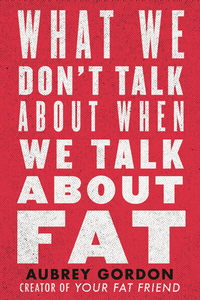You need to sign in or sign up before continuing.
Take a photo of a barcode or cover
This is an eye-opening read that reveals both the systematic bias and the personal abuse that people who live in larger bodies face in our culture. Gordon weaves memoir with statistics and studies to create a compelling picture of how anti-fat bias hurts fat people. And she presents a vision of an inclusive world (with action points!) where our bodies are just facts and no one is judged for their size, race, ethnicity, ability, sexuality, or gender.
emotional
informative
reflective
fast-paced
emotional
hopeful
informative
reflective
sad
medium-paced
informative
reflective
slow-paced
Good, awful formatting, really informative though!
I’ve always thought I had very little bias surrounding weight but man oh man, I was wrong. This was eye opening and so educational. Amazing job!
This is one of those books that should be required reading. Although I went into this already supportive of the HAES movement and fat activism, I didn't have a rebuttal for those who insisted that obesity was a health concern that shouldn't be downplayed or ignored. Gordon makes a strong case that the negative health effects traditionally associated with obesity are more likely tied to two things: 1) the documented negative effects of restrictive eating, excessive exercise, constant weight fluctuation, and more extreme measures like diet pills, and 2) the daily harassment and discrimination that fat people experience, which takes a physical toll on the body (similar to the "weathering" that bodies have been found to undergo due to poverty and racism). She demonstrates how anti-fat attitudes show up everywhere from the media to the doctor's office and envisions a world in which weight is not associated with morality or work ethic but instead is seen as an attribute, just like height, that exists on a broad spectrum in humans.
There is some repetition within these pages because Gordon has written this as a collection of essays that could each be read independently, which means she references some of the same stories and makes the same points in multiple essays. (She also overuses certain words, like "ubiquitous," which I think showed up 5-6 times in the introduction alone.) These aspects didn't take away from the core message or the overall strength of the book for me, but it's helpful to know the setup going in so you aren't confused why Gordon is seemingly telling you something for the first time four separate times.
At only 208 pages (or under 7 1/2 hours on audio at standard speed), there's no excuse not to pick this one up. We could create a much better world if more people understood everything captured in this book.
There is some repetition within these pages because Gordon has written this as a collection of essays that could each be read independently, which means she references some of the same stories and makes the same points in multiple essays. (She also overuses certain words, like "ubiquitous," which I think showed up 5-6 times in the introduction alone.) These aspects didn't take away from the core message or the overall strength of the book for me, but it's helpful to know the setup going in so you aren't confused why Gordon is seemingly telling you something for the first time four separate times.
At only 208 pages (or under 7 1/2 hours on audio at standard speed), there's no excuse not to pick this one up. We could create a much better world if more people understood everything captured in this book.
THIS BOOK IS AMAZING ALL PEOPLE SHOULD READ IT Plus it’s beautifully written
challenging
informative
2.5 stars. The topic of this book and its message is extremely valuable, but the execution left a lot to be desired. I listened to this on audio. The narrator was fine, but the flowery writing was eye-roll inducing over audio in a way that it may not have been were I reading the print copy. The lack of organization was the most frustrating, however. I think her topic choices were definitely interesting: diets/diet culture; reality television/entertainment, medical discrimination, etc., but it was difficult to tell what the focus of each chapter was with repetitive examples used multiple times in the separate essays. I've never read Gordon's blog, but it seems like the book was perhaps just her blog essays minimally stitched together with no thought given to the whole? In books like this, I prefer the science to take center stage with anecdotal examples weaved in to add a personal touch. This was the opposite, with Gordon's personal anecdotes taking center stage with minimal science woven in. For example, she mentions that there are 59 types of obesity (twice), but doesn't ever dig deeper into that. Overall, I think it is a valuable entry into this topic, but no more than a toe-dip into the water of fat activism.
I liked this a lot but listeners of Maintenance Phase will likely feel that there’s a lot of retreading of topics covered in the show. (This book was published before MP existed.) There’s also some slightly dated moments and items that I imagine Aubrey wouldn’t fully defend now. I look forward to reading her newest!
The book is extremely well-researched with a great list of citations, likely useful for other academics or just people who are curious. There’s also an extensive index.
The book is extremely well-researched with a great list of citations, likely useful for other academics or just people who are curious. There’s also an extensive index.





